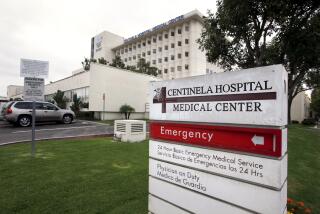Hospital to Spend $500,000 to Avert Baby Mix-Ups
- Share via
ORANGE — Admitting widespread problems in the maternity ward, the president of St. Joseph Hospital said Monday that the hospital will buy an electronic security system to ensure that a newborn is never again sent home with the wrong parents.
The announcement followed revelations that the Valentine’s Day baby switch--in which a Tustin couple left the hospital with a child who did not belong to them--was not an isolated incident as was first believed, President Larry Ainsworth said, but part of a systemic problem.
Ainsworth said he felt nauseated by news that such mistakes had been made at his hospital, calling the last mix-up “every parent’s nightmare.”
“Clearly we have a problem in our mother / child unit,” Ainsworth said.
Nurses mixed up babies at least three other times in the last year, hospital officials said, although all the mistakes were straightened out before the babies left the hospital. The most serious case involved a mother breast-feeding the wrong infant for 30 minutes.
The hospital is under investigation by state medical officials for the baby switches and investigators from the Department of Health Services spent much of Monday in the hospital’s maternity ward. But hospital officials defended their earlier decision not to report the problems to the state, saying that the errors did not meet the threshold of reportable problems.
St. Joseph will spend up to $500,000 for a system in which the baby’s and mother’s wristbands will be electronically encoded. The bands cannot be removed without being read first by an automated scanner that checks to see that they match. Any attempt to remove an infant from the maternity ward without removing the band would set off an alarm.
In addition to the new security system, which would not prevent such incidents as the wrong mother breast-feeding a baby, hospital administrators announced a top-to-bottom overhaul of maternity ward policy.
Several health care professionals said the incident puts pressure on St. Joseph to take swift action, minimize negative fallout from the publicity and show that it is a safe place to have a baby. Maternity units are a major source of revenue for hospitals, which have been hit hard by the switch to managed care. About 5,500 babies are born each year at St. Joseph.
“Labor and delivery is still one of those growth areas for hospitals,” said Sam Roth, spokesman for the Orange County Medical Assn. “They want to do a good job so moms will come back. The delivery side is a very important financial component of the hospital business today.”
Ainsworth, who acknowledged that births are a big part of his hospital’s business, said mistakes happened because staff nurses did not follow hospital policy.
“Those kinds of errors simply cannot be tolerated,” he said.
He defended the handling of the incident, even though hospital officials at first represented the mix-up as a one-time event. Prior problems in the ward came to light last week only after the couple whose son was breast-fed last June by the wrong mother contacted The Times. The parents in that case said the hospital had assured them that changes would be made to prevent future incidents.
Ainsworth said that, when asked, the hospital acknowledged its previous baby switches and did change its policy after the June incident. That made it especially disturbing, he said, to learn that four registered nurses on staff had violated the new procedures, which call for nurses to compare the wristbands on infants and mothers whenever taking a baby from a bassinet, transporting the newborn to the mother’s room, and again when bringing the baby back to the nursery. In addition, the policy required that one baby at a time be taken to the mothers’ rooms, to avoid possible confusion between two infants.
It’s a tedious procedure that must be undertaken several times a day for each newborn, Ainsworth said. Yet he conceded that the hospital took no steps to ensure that nurses were following the rules through random supervisor checks or patient surveys.
In the Valentine’s Day case, Brian Lambert and Iliana Bravo of Tustin left the hospital with the wrong baby boy, while their son Aaron was given to another mother. That mother noticed the error when she checked the baby’s wristband after breast-feeding him.
Ainsworth said swift and decisive action was taken after that incident, including the firing of two nurses and the creation of five staff teams to do a top-to-bottom review of maternity ward procedures.
A third nurse who was involved in the June mix-up was dismissed months ago, said Katie Skelton, vice president of patient care services and director of nursing.
Perhaps one other similar incident has been reported in Orange County in the last 15 years, said Jackie Lincer, of the state Department of Health Services.
More to Read
Sign up for Essential California
The most important California stories and recommendations in your inbox every morning.
You may occasionally receive promotional content from the Los Angeles Times.














